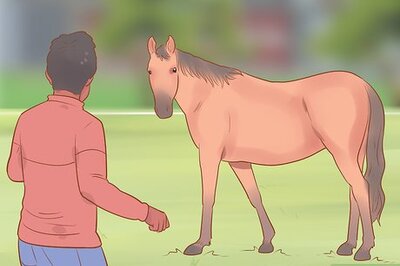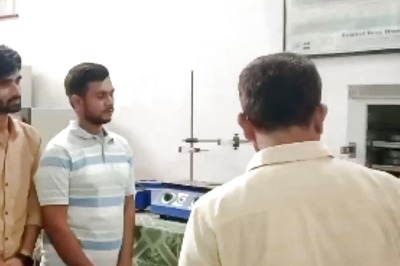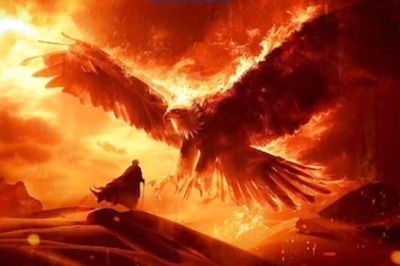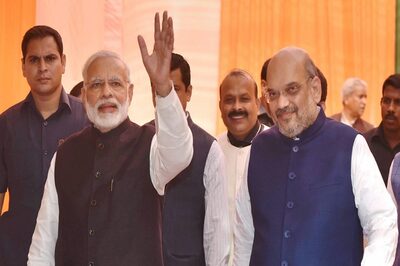
views
Washington: With the US administration stepping up behind-the-scenes politicking to clinch the landmark nuclear deal, US President George Bush on Thursday assured Prime Minister Manmohan Singh that his administration was "working hard to get it passed by the Congress as quickly as possible."
"It (nuclear deal) has taken a lot of work on both our parts, a lot of courage on your part and of course we want the agreement to satisfy you and get it out of our Congress," Bush told Manmohan Singh in the presence of media persons at the Oval Office of the White House on a drizzly evening in the US capital.
"And so we are working hard to get it passed as quickly as possible," Bush said while lauding his Indian guest for "his friendship and leadership" for transforming the nature of relationship between the two countries.
"You and I have worked hard to change the relationship between the US and India. And we have worked hard to achieve that," said Bush even as his administration intensified efforts to fast-track the approval for the 123 bilateral civil nuclear cooperation pact which could happen as early as Friday - the last day of the current session of the US Congress.
Hours before Bush met Manmohan Singh, US ambassador to India David Mulford indicated the deal could be wrapped up in a couple of days.
The House of Representatives Thursday considered a resolution sent by the Rules Committee to suspend the rules relating to 44 legislations, including "A Bill relating to India nuclear cooperation."
The nuclear deal is likely to be considered by the Congress on Friday leading to the much-needed Congressional nod that will effectively seal the nuclear deal paving the way for India's resumption of global nuclear trade with the world and sharpening of its strategic engagement with the US.
Bush held talks with Manmohan Singh soon after meeting Republican presidential candidate John McCain and Democratic challenger Barack Obama to discus the $700 billion bail-out package to save the Wall Street from collapse - a gesture that underlined his unwavering commitment to concluding the "historic" nuclear deal with the US.
The two leaders held talks for nearly 40 minutes on an entire raft of issues ranging from trade, technology and civilian nuclear cooperation to terrorism, education and research that could sharpen India's economic and strategic engagement with the US.
They also discussed the festering militancy in tribal lands of Pakistan bordering Afghanistan and the need for firming up solidarity in the battle against terrorism. "I appreciated very much your briefing on the neighbourhood in which you live. It was very informative and it helps me make decisions and it helps me formulate policy," Bush said, indicating that the two countries may inch closer in addressing the problem of terrorism and stability in Afghanistan in days to come.
In remarks that indicated that there are still some last-minute contentious issues, the two leaders hoped tht the final deal will be worked out in a manner that will satisfy both sides.
"I sincerely hope that this agreement, which is now before the US Congress, will be approved in a manner which will be satisfactory from the point of view of both of our countries," Manmohan Singh said.
Manmohan Singh was referring to efforts by the non-proliferation hawks in Democratic Party to introduce some killer riders like a reference to India's cooperation with the US in isolating Iran which could potentially kill the nuclear deal.
A beaming grey-suited Bush fondly recalled his visit to India in March 2006. "I will never forget my visit to your country, Mr Prime Minister. I remember telling my friends when I got back what an exciting place India is," Bush said.
Sitting next to him, Manmohan Singh, clad in black suit, returned the compliment and praised Bush for his "historic role" in the "massive transformation of India-US relations and for bringing the two democracies closer to each other since their July 18, 2005 meeting in Washington that started the process of ending India's nuclear isolation.
Manmohan Singh, who has invested considerable political capital and even staked his government for the sake of the deal he believed will bolster India's energy security, credited Bush for ending three-and-a-half decades of "nuclear apartheid" against India.
Manmohan Singh ended his address to Bush on an emotive tone saying: "This may be my last visit to you during your presidency. The people of India deeply love you. And all that you have done to bring our two countries closer to each other is something history will remember."




















Comments
0 comment